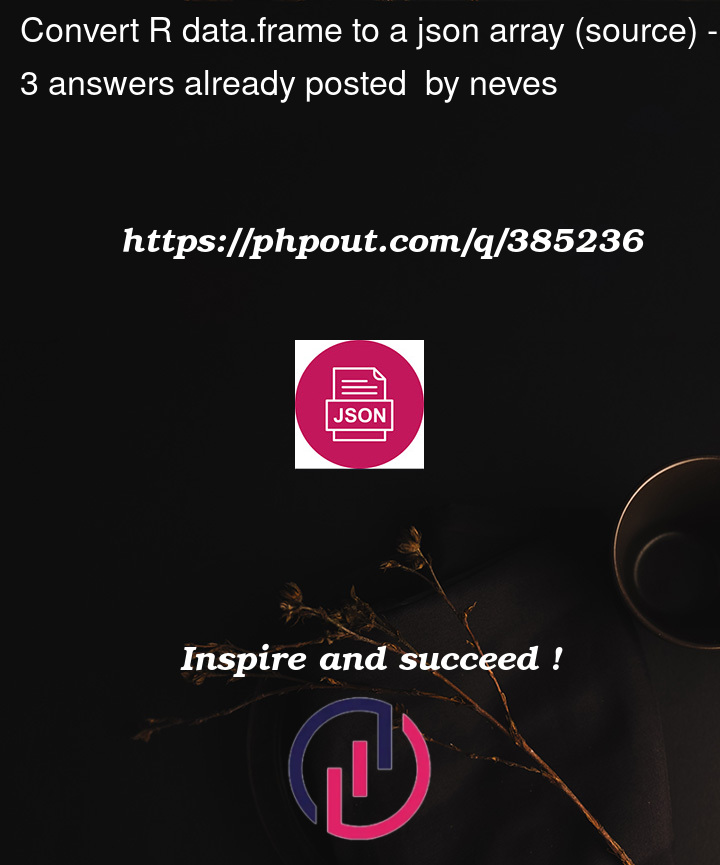I have this data.frame in R:
dataset <- data.frame(
product = c('2012', '2013', '2014', '2015', '2016', '2017'),
MilkTea = c(56.5, 82.1, 88.7, 70.1, 53.4, 85.1),
MatchaLatte = c(51.1, 51.4, 55.1, 53.3, 73.8, 68.7),
CheeseCocoa = c(40.1, 62.2, 69.5, 36.4, 45.2, 32.5),
WalnutBrownie = c(25.2, 37.1, 41.2, 18, 33.9, 49.1)
)
I’m trying to leave it with this same (identical) structure:
dataset: {
source: [
['product', '2012', '2013', '2014', '2015', '2016', '2017'],
['Milk Tea', 56.5, 82.1, 88.7, 70.1, 53.4, 85.1],
['Matcha Latte', 51.1, 51.4, 55.1, 53.3, 73.8, 68.7],
['Cheese Cocoa', 40.1, 62.2, 69.5, 36.4, 45.2, 32.5],
['Walnut Brownie', 25.2, 37.1, 41.2, 18, 33.9, 49.1]
]
}
I try this:
library(jsonlite)
toJSON(x = dataset, dataframe = "columns", pretty = TRUE)
"product": [2012, 2013, 2014, 2015, 2016, 2017],
"MilkTea": [56.5, 82.1, 88.7, 70.1, 53.4, 85.1],
"MatchaLatte": [51.1, 51.4, 55.1, 53.3, 73.8, 68.7],
"CheeseCocoa": [40.1, 62.2, 69.5, 36.4, 45.2, 32.5],
"WalnutBrownie": [25.2, 37.1, 41.2, 18, 33.9, 49.1]
But I would like to leave you with the first structure I put above. Also, how to insert this JSON created inside an HTML(...) something like:
HTML("<script>put JSON here</script>")
So that I can use it in a later analysis.




3
Answers
@SamR’s solution is straight-forward, but for fun here is a solution using the jsoncons C++ library made available through the CRAN packages rjsoncons and cpp11
Start by creating a JSON string as in the question
Write a C++ function that takes this string and transforms it to the desired format, using jsoncons documentation. Here’s what I have, in a file called ‘reshape.cpp’:
Compile this in R with
cpp11::cpp_source(), and use the resultThe output is
Maybe you want this.
Your expected output is not valid json, which requires double rather than single quotes and also requires keys to appear in quotes (e.g.
"source"rather thansource).I’ll address the part of the question about how to create a json list which mixes strings and numeric values, e.g.:
This is valid json, though unusual. You will need to use an R list, rather than a vector, which if you mix strings and numeric type will coerce all values to
character. For example:Output:
The key is that a list is technically a list of vectors, so we must unbox the elements to ensure the final representation is an array of values, rather than an array of arrays of length one, when encoded into json.